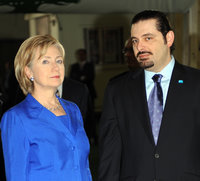A propos my post of the other day, here’s more along the same lines from Carlyle Thayer writing at East Asia Forum, who frames it as China’s soft power vs. U.S. smart power. And once again, U.S. smart power seems to have made a significant comeback. Significantly, as Thayer puts it, “The timing is bad for China as the regional security architecture looks set to gain a new lease on life and expand into new areas of cooperation.” Add to that the fact that the soon-to-include-the-U.S. grouping, EAS, is apparently gaining an edge over the sans-U.S. ASEAN+3 grouping favored by […]
Latest Archive
Free Newsletter
In the midst of a post on Turkey-India relations, and how they are limited by each seeing the other through the prism of Cyprus and Pakistan respectively, Mehmet Ozkan makes a good point about Turkey’s lack of membership in any of the emerging power forums, like BRIC or IBSA. He argues that such an involvement would help India and Turkey develop institutional ties that they currently lack. But it occurred to me that it would also be a solid credential ratifying Turkey’s status as not just just a regional power, but as a global middle power. I’m surprised that hasn’t […]
This is a good point by Galrahn at Information Dissemination, on the disconnect between trends in European military reform and trends in U.S. strategic thinking: We will have to wait and see what Germany ultimately decides to do, but in reading military reform arguments from various nations across Europe, including Russia, the 21st century army models of expeditionary forces most often include discussions regarding amphibious lift capacity and numbers of medium and heavy lift helicopters. In other words, the capabilities that most mimic the U.S. Marines are more desired by the rest of the world than the capabilities of a […]

The Washington Post’s recent series, “Top Secret America,” depicts significant organizational challenges in the intelligence community. Many of its observations have merit, but organizational dysfunction is not confined to the intelligence system. The Post’s description of the sprawling, uncoordinated intelligence bureaucracy mirrors the shortcomings of the overarching national security system, which has repeatedly demonstrated that it is not capable of handling today’s threats and opportunities. The blame for this antiquated system does not solely belong to the Bush or Obama administrations; systemic problems date back to the design of the national security apparatus in 1947. In recent decades, an increasingly […]

A covert Israeli-Lebanese intelligence war, combined with tension along the two countries’ border and fears of renewed Lebanese civil strife, has created policy dilemmas for the United States and France as they seek to strengthen the Lebanese government while isolating Hezbollah. The Shiite militia-cum-political party, which the U.S. and France have both designated as a terrorist organization, occupies two cabinet posts in Lebanon’s constitutionally mandated power-sharing arrangement. The intelligence war as well as a recent Lebanese-Israeli border clash in which five people were killed have persuaded Lebanese President Michael Sulaiman and Prime Minister Saad Hariri to increase coordination between Lebanon’s […]

Torrential monsoon rains since late July have flooded Pakistan’s Swat Valley and portions of neighboring Afghanistan, killing nearly 2,000 people and displacing around 2 million. Relief efforts have included deployments of troops and helicopters by the Pakistan military, the NATO force in Afghanistan and, perhaps surprisingly, the nascent Afghan air corps. “Right now, the Afghan air force has four Mi-17 helicopters in Pakistan supporting that relief effort,” said U.S. Air Force Brig. Gen. Michael Boera, head of Afghan air training. The Afghan deployment underscores an encouraging trend in the nine-year-old war against the Taliban. On Aug. 11, top NATO commander […]

NEW DELHI — Indian Prime Minister Manmohan Singh called the recent passage of the Civil Liability for Nuclear Damages bill the end of “the nuclear apartheid that the world had imposed on India.” The language was meant to appeal to a domestic audience; for most international observers, the law simply marks India’s return to the international nuclear market. But in its final form, the liability law has left few on either side of the debate entirely satisfied. The contentious legislation, introduced this April in parliament, was steered through by the Congress-led government with help from the largest opposition party, the […]
